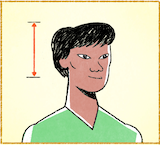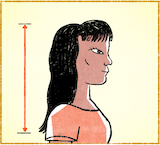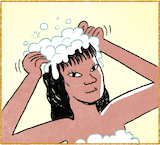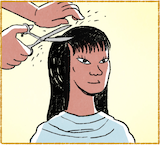



นี้คืออี่หยัง นี้คือคน เป็นคนพุซาย เขาเป็นพุซาย
พุซายมีผมสั้น ผมบ่ญาวหลาย มีผมสั้นสีดำ ผมเขากะเป็นสีดำๆ งามๆ อยู่
พุซายคนนี้เขายิ้มบ่ จักคือกันเขาคือสิยิ้ม แต่ว่าบ่ยิ้มหลาย หน้าตาของเขากะบ่สดซื้นปานใด
16
นี้คืออี่หยัง อันนี้กะคือคนคือกันนั้นหละ
อันนี้เป็นพุหญิง บ่แม่นพุซาย เขาเป็นพุหญิง เป็นพุหญิงผมญาว
พุหญิงคนนี้ผมญาวส่ำใด พุหญิงคนนี้กะผมญาวหลายอยู่ ผมญาวคัก ผมญาวหลายเติบ
ผมเขาญาวฮอดบ่าไหล่เอาโลด ผมเขาญาวเลยบ่าไหล่ไปอีก ญาวคัก ญาวแน่ ญาวหลาย
พุหญิงคนนี้เขายืนจั่งใด เขายืนหันข้าง เขาอ่วยข้างไปทางข้าง เขาหันไปทางข้างนั้นหละ
เขาบ่ได้หันหน้าตง เขาบ่ได้อ่วยหน้ามาทางหน้า เขาอ่วยหน้าไปทางข้าง
17
เขากำลังเฮ็ดหญัง เขากำลังสะผมอยู่ หลือสะหัวหละ
พุหญิงคนนี้เขากำลังสะหัวอยู่ เขาอาดสิสะหัวอยู่ในห้องน้ำ หลืออยู่หม้องใดหม้องหนึ่งนี้หละ เขากำลังทำความสะอาดหัว หลืออาบน้ำอยู่
เขาใซ้อี่หยังสะผม เขากะใซ้แซมพู หลือผงสะหัวนั้นหละ เอาไว้ถ้าสะหัว
ขั้นสะหัวแล้ว กะสิเฮ็ดให้หัวสะอาด หลือผมเฮาสะอาดนั้นหละ เฮ็ดให้สดซื้น
สีขาวๆ อยู่เทิงหัวพุหญิงคนนี้เป็นอี่หยัง มันเป็นฟอง ที่เป็นฟองเกิดจากแซมพู หลือเกิดจากผงสะหัวนั้นหละ ขั้นเฮาถูๆๆ อยู่เทิงหัวแล้ว มันกะสิเป็นฟอง หลือเกิดฟองขึ้น
พุหญิงคนนี้เขาสะหัวหลืออาบน้ำอยู่ใส เขาเฮ็ดอยู่ในห้องน้ำ หลืออยู่หม้องใดหม้องหนึ่งนี้หละ อันนี้กะบ่ลู้คือกัน จักว่าเขาอาบน้ำอยู่ใส
18
พุหญิงคนนี้เขากำลังเฮ็ดหญัง เขากำลังตัดผมอยู่
เป็นหญังเขาคือตัดผม ผมเขาอาดสิญาวหลาย หลืออาดสิญาวคักกะได้ เขากะเลยตัดผม เพื่อที่สิให้ผมสั้นๆ หลือกะบ่ให้มันญาวหลาย
เขาใซ้อี่หยังตัดผม เขาใซ้กันไก หลือมีดนั้นหละ เอาไว้ถ้าตัดผม เอาแนวคมๆ ตัดผม เอาอี่หยังตัดกะได้ ที่สามาดตัดเข้า
พุหญิงคนนี้เขาตัดผมอยู่ใส จักคือกัน เขาอาดสิตัดผมอยู่ล้านเสิมสวย หลืออยู่ล้านตัดผมกะได้ จักว่าเขาตัดอยู่ใส หลือสามาดใซ้หมู่ หลือใซ้แม่ ใซ้น้อง ใซ้น้า ใซ้พุใดตัดกะได้ ที่คนนั้นสามาดตัดได้
ขั้นเขาตัดผมแล้วเขาสิงามบ่ อันนี้กะบ่ฮู้คือกัน จักว่าสิงามหลือบ่งาม แล้วแต่คนตัด แล้วแต่ซง เฮาสามาดตัดผมได้หลายซงหลายแบบ ตัดแบบใดงามกะงาม ตัดแบบใดบ่งาม มันกะบ่งาม
Link to overview page
Link to dictionary
| Isaan | Pronunciation | Tones | Thai | English/Notes |
|---|---|---|---|---|
| นี้ | ni: | HF | นี้ | 1. this 2. here |
| คือ | khʉ: | HR | คือ | 1. to be, to resemble, like, as 2. why {บักหล้าคือบ่เก็บโต่ะแน่ = [addressing a young boy] Why haven't you cleared the table?} |
| อี่หยัง | i:-yaŋ | H-M | อะไร | 1. what {นี้คืออี่หยัง = What is this?} {มื้อนี้เจ้าเฮ็ดอี่หยัง = What are you doing today?} {กินเข้างายกับอี่หยัง = What did you have for breakfast?} 2. something, anything, (in negations) nothing {บ่ต้องเฮ็ดอี่หยังอีกเลยนอกจากใส่ปุย = [we] don't need to do anything besides adding fertilizer} |
| คน | khon | HR | คน | person, people |
| เป็น | pen | M | เป็น | 1. to be, to exist 2. to be able to 3. to suffer, sth. happens to 4. เป็นหญัง[...]คือ in initial position: why? {เป็นหญังเขากะคือแปงฟัน = Why is he brushing his teeth?} {เป็นหญังเคี่ยงบินมันคือสิตก = Why is the airplane falling down?} |
| พุซาย | phu-sa:i | H-HR | ผู้ชาย | man, male |
| เขา | khao | M | เขา | personal pronoun: he, she |
| มี | mi: | HR | มี | 1. to have 2. there is |
| ผม | phom | M | ผม | hair |
| สั้น | san | LF | สั้น | short |
| บ่ | bɔ: | H | ไม่ | 1. no, not 2. question particle, transforming a statement into a question Notes: spelling exception in line with common usage on social media |
| ญาว | ɲa:o | HR | ยาว | long |
| หลาย | la:i | M | เยอะ, มาก | many, much, very |
| สี | si: | M | สี | 1. color 2. colored pencil, crayon |
| ดำ | dam | M | ดำ | 1. black 2. to transplant rice seedlings {ดำนา = to transplant rice seedlings} |
| กะ | ga | M | ก็ | 1. then, consequently 2. also |
| งาม | ŋa:m | HR | สวย | beautiful, handsome, splendid |
| อยู่ | yu: | H | อยู่ | 1. to be (located) at 2. yet, still 3. auxiliary indicating continuous or progressive action {ทอดปาอยู่ในกะทะ = (in the process of) frying a fish in the pan} {แม่กำลังเมี้ยนเฮียนอยู่ = mother is cleaning/tidying up the house} |
| ยิ้ม | yim | HF | ยิ้ม | to smile |
| จัก | jak | M | จัก | 1. answer to a question: [I] don't know, don't know exactly, [I'm] not sure {พุซายคนนี้เขาเถ้าไป่ จัก จักเถ้าหลือบ่เถ้า เบิ่งบ่ค่อยออก = Is this man here already old? I don't know. I can't see clearly whether he's old or not.} {เขาเว้ากันอยู่ใส จักคือกัน = Where are they talking? I don't know either.} 2. exact(ly), what exactly {จักต้มอี่หยังกะบ่ฮู้ = I don't know what (exactly) he is cooking} {บ่ลู้คือกันจักปาอี่หยัง = I don't know either what kind of fish this is} 3. how much/many? {ต้นไม้มีจักต้น = How many trees are there?} {ตอนนี้จักโมงแล้ว = What time is it now?} {มือของเฮานี้สิมีจักนิ้ว = How many fingers do our hands have?} 4. a bit, a little bit {จักหน่อย/จักหน่อยหนึ่ง = a bit, a little bit} |
| คือกัน | khʉ:-gan | HR-M | เหมือนกัน | 1. also, likewise, similarly {ยินดีที่ได้ฮู้จักคือกันคับ = Nice to meet you too!} 2. in negative sentences: either {บ่ลู้คือกัน = I don't know either} {จักคือกัน = I don't know (either)} |
| สิ | si | M | จะ | future tense auxiliary {เขากำลังสิตื่น = he's about to wake up} {สิไปตะหลาด = [I'm] going to the market} |
| แต่ว่า | tɛ:-wa: | H-H | แต่ว่า | 1. but 2. only {ฮู้แต่ว่าเขายืนอยู่พุเดียว = I only know that he's standing there by himself} |
| หน้าตา | na:-ta: | LF-M | หน้าตา | face |
| ของ | khɔ:ŋ | M | ของ | of, belonging to |
| สดซื้น | sot-sʉ:n | M-HF | สดชื่น | fresh, refreshed Notes: pronunciation: also realized as สดชื้น |
| ปานใด | pa:n-dai | M-M | เท่าไหร่, มาก | 1. after negative: (not) very, (not) so much {บ่ใหญ่ปานใด = not so large, not very large} 2. how much, how many {เฮาบ่สามาดนับได้ว่ามันมีหลายปานใด = it's impossible to count how many there are} |
| อัน | an | M | อัน | 1. thing, object 2. general clf. for objects |
| นั้นหละ | nan-la | HF-M | นั่นแหละ | auxiliary for emphasis at the end of a phrase |
| พุหญิง | phu-ɲiŋ | H-M | ผู้หญิง | woman, female |
| บ่แม่น | bɔ:-mɛ:n | H-H | ไม่ใช่ | 1. not {เขาเป็นพุหญิง เขาบ่แม่นพุซาย = she's a woman, she's not a man} 2. no |
| ส่ำ | sam | H | 1. what size?, what shape? {พุหญิงคนนี้ผมญาวส่ำใด = How long is this woman's hair?} 2. equal to (in size), as large as {โตบักใหญ่หนึ่ง โตส่ำกะทะเอาโลด = a large [fish], filling the whole pan} {อายุส่ำกัน = to be of the same age} {[หนังสือพิม]สิมีข้อมูนบ่หลายส่ำหนังสือ = [a newspaper] doesn't have as much information as a book} |
|
| ใด | dai | M | ใด | 1. which, that one which, what, how {เขานั่งแบบใด เขานั่งขดตะหมาดอยู่ = How is he sitting? He's sitting cross-legged.} {ตอนใด = when?} 2. whichever, whoever {หม้องใดหม้องหนึ่ง = some place, somewhere} {ขั้นเฮาอยากตื่นญามใด เฮากะตั้งเวลาปุกญามนั้น = If we want to get up at a certain time, we set the alarm to that time} Notes: sentence-final often with a marked rising tone |
| คัก | khak | H | intensifier: very, very much | |
| หลายเติบ | la:i-tə:p | M-LF | many, much, very (more intense than หลาย) | |
| ฮอด | hɔ:t | HF | ถึง | 1. to arrive, to attain {ฮอดจุดหมายปายทาง = (airplane, train etc.) to arrive at one's destination} {มันทันได้ฮอดหกโมงอยู่ = it's not yet 6 o'clock} 2. to, at {ผมญาวฮอดบ่าไหล่เอาโลด = long hair down to the shoulders} 3. about {บ่ได้เว้าฮอด = [I] haven't talked about [this]} {คนที่เฮาเว้าฮอดวั่งหั้นหละ = the person we've just talked about} |
| บ่าไหล่ | ba:-lai | H-H | บ่าไหล่ | shoulder |
| เอาโลด | ao-lo:t | M-HF | เอาเลย, ทำเลย, จริงๆ | in final position: intensifier {โตส่ำกะทะเอาโลด = [a fish] as large as the pan!} {เกียบเต็มถ้วยเอาโลด = the bowl is almost full!} {ทะนาคานมันสิไปตั้งไว้อยู่ซู่หม้องเอาโลด = banks are everywhere!} |
| เลย | lə:i | HR | เลย | 1. futher on, beyond, past {เข็มน้อยเลยเลขสิบสองไป = the minute hand has passed number twelve} 2. too much 3. at all 4. definitively 5. completely, utterly |
| ไป | pai | M | ไป | 1. to go 2. auxiliary indicating action extending into the future |
| อีก | i:k | LF | อีก | 1. more, again 2. other, another |
| แน่ | nɛ: | H | แน่, บ้าง | 1. some, somewhat 2. final particle, used to ask for examples (similar to Thai บ้าง at the end of a question) {หม้อใซ้เฮ็ดอี่หยังได้แน่ = What (different things) can a pot be used for?} {น้ำอัดลมซื้อได้อยู่ใสแน่ = Where/in which places can one buy soft drinks?} 3. final particle, when giving examples {มีเทิงส้งแน่ มีเสี้ยแน่ มีเกิบแน่ = there are trousers, shirts, shoes etc.} 4. final particle, used to give a command {ไปปิดหน้าต่างให้แน่ = Close the window!} 5. final particle, acting as an intensifier, especially in the pattern ... คัก ... แน่ {สูงคักสูงแน่ = very high} {ญ้องเฮาคัก ญ้องเฮาแน่ = [he's] praising me a lot} |
| ยืน | yʉ:n | M | ยืน | to stand |
| จั่งใด | jaŋ-dai | H-M | ยังไง, แบบไหน | how, in what manner {บักนาวมันมีลดซาดจั่งใด = Lime fruits have what kind of taste?} {เขาปิดแอจั่งใด = How is he switching off the A/C?} {เทียนใซ้จั่งใด = How's a candle used?} {สิใซ้จั่งใด = how is [it] used?} |
| หัน | han | M | หัน | to turn around/towards, to face |
| ข้าง | kha:ŋ | LF | ข้าง | 1. side {มีหูจับสองข้าง = there are handles on both sides} 2. next to {วางอยู่ข้างๆ ก่องใบใหญ่ = it's placed next to the large box} {เขายืนอยู่ข้างๆ อีกพุหนึ่ง = he's standing next to another person} 3. clf. for body parts which come in pairs (eyes, ears, legs etc.) {เขามีตาสองข้าง = she has two eyes} |
| อ่วย | u:ai | H | to turn to, to face, to point to {เขาอ่วยหน้าไปทางข้าง = she's facing towards the side} {เข็มใหญ่อ่วยไปทางเลขห้า = the hour hand points to the number five} | |
| ทาง | tha:ŋ | HR | ทาง | 1. way, direction {พุหญิงกะสิไปทางหนึ่ง พุซายกะสิไปอีกทางหนึ่ง = the woman goes one way, the man another way} {ตะเว็นไปทางใด = Where has the sun gone?} {เขาถีบจักกะย๊านไปทางหน้า = he's biking on/onward/forward} {มาเว้า มาว่าเฮาในทางที่บ่ดี = he's scolding [me], he's talking to me improperly} 2. by, through, via etc. {เว้าทางโทละสับ = to talk on the phone} |
| ได้ | dai | HF | ได้ | 1. can 2. to get, to obtain 3. before verb: indicating past tense 4. บ่ได้ + verb: not |
| หน้า | na: | LF | หน้า | 1. front {ปะตูหน้า = front door} 2. face {เขากำลังล้างหน้า = he's washing his face} 3. auxiliary: conditional tense {เขาหน้าสิเป็นพุบ่าวพุสาวกัน = they are probably groom and bride} {กะหน้าสิส้มอยู่ = it's likely to be sour} 4. season {หน้าฮ้อน = hot season} 5. page 6. clf. for pages {เฮาอ่านฮอดหน้านั้นแล้ว = we've read until this page} |
| ตง | toŋ | M | ตรง | 1. at 2. to be precise at, to be exact {ห้าโมงตง = exactly five o'clock} 3. straight |
| มา | ma: | HR | มา | 1. to come 2. auxiliary expressing action towards the present or focal time {กะคุเฮ็ดมาจากอี่หยัง = What is the bucket made of?} {แล้วเขากะเก็บเงินจากพุนั้นมา = and then she takes the money of that person} |
| ทางหน้า | tha:ŋ-na: | HR-LF | ทางหน้า | forward, in front (of) |
| กำลัง | gam-laŋ | M-HR | กำลัง | auxiliary indicating continuous or progressive action |
| เฮ็ด | het | H | ทำ | to do, to make |
| หญัง | ɲaŋ | M | อะไร, เป็นหญัง = ทำไม | 1. what {เขากำลังเฮ็ดหญัง = What is he doing?} {ธูปเอาไว้เฮ็ดหญัง = What are incense sticks for?} 2. something, anything, (nothing) 3. เป็นหญัง[...]คือ in initial position: why {เป็นหญังเขาคือใส่บักพิกลงไปในกวยเตียว = Why is he putting chili in [his] noodle soup?} {เป็นหญังหน้าต่างมันคือเปิด = Why is the window open?} {เป็นหญังมันคือมีควนไฟ = Why is there smoke?} |
| สะ | sa | M | สระ | to wash, to shampoo |
| หลือ | lʉ: | M | หรือ | or |
| หัว | hu:a | M | หัว | 1. head 2. clf. for onions, bulbs of garlic |
| หละ | la | M | แหละ, ล่ะ | 1. auxiliary for emphasis at the end of a phrase 2. auxiliary to create a follow-up question: And what about ... ? {แล้วลดคันที่สองหละ = And what about the second car?} |
| อาด | a:t | LF | อาจ | 1. might, may, will 2. likely |
| ใน | nai | HR | ใน | in, within |
| ห้องน้ำ | hɔŋ-na:m | LF-HF | ห้องน้ำ | bathroom |
| หม้อง | mɔŋ | LF | ที่, แห่ง, บริเวณ | 1. place, area {หลายที่หลายหม้อง = in many places} {หม้องใดหม้องหนึ่ง = some place} 2. clf. for places |
| หนึ่ง | nʉŋ | H | หนึ่ง | 1. one 2. after adjective: intensifier {บักคักหนึ่ง = very much} {อันบักใหญ่หนึ่ง = very large}, or attenuates the meaning {กะดาดมันแผ่นน้อยๆ หนึ่ง = the piece of paper is [relatively] small} |
| นี้หละ | ni:-la | HF-M | นี่แหละ | auxiliary for emphasis at the end of a phrase |
| ทำความสะอาด | tham-khwa:m-sa-a:t | HR-HR-M-LF | ทำความสะอาด | to clean, to clean up, to do the cleaning |
| อาบน้ำ | a:p-na:m | LF-HF | อาบน้ำ | to take a bath/shower |
| ใซ้ | sai | HF | ใช้ | to use |
| แซมพู | sɛ:m-phu: | HR-HR | แชมพู | shampoo |
| ผงสะหัว | phoŋ-sa-hu:a | M-M-M | แชมพู | shampoo |
| เอา | ao | M | เอา | to take, to give {เขากำลังเอาก่องไปซั่ง = he's taking the boxes to weigh them} {หมอกำลังเอายาให้คนป่วยกิน = the doctor is giving medicine to the patient} {เอาไว้ถ้า = is for, is used for, has the purpose of} |
| ไว้ถ้า | wai-tha: | HF-LF | usually in a positive statement or answer: is for, is used for, has the purpose of {กะทะมีไว้ถ้าทอด = a pan is for frying} {น้ำบักนาวมีไว้ถ้าปุงอาหาน = lime juice is used to season food} {ปากกามีไว้ถ้าเขียน = a pen is for writing} {กะเทียมเอาไว้ถ้าเฮ็ดแนวกิน = garlic is used to make food} {ขาเอาไว้ถ้าญ่าง = legs are for walking} {เกิบเอาไว้ถ้าใส่ = shoes are for wearing} Notes: see also ไว้ |
|
| ขั้น | khan | LF | เมื่อ | when, if |
| แล้ว | lɛ:o | HF | แล้ว | 1. finished 2. already 3. and then, and next (especially แล้วกะ) 4. auxiliary for past tense |
| ให้ | hai | LF | ให้ | 1. to give {หมอกำลังเอายาให้คนป่วยกิน = the doctor is giving the patient medicine} 2. for 3. to allow, to be allowed |
| สะอาด | sa-a:t | M-LF | สะอาด | clean |
| เฮา | hao | HR | เรา | 1. personal pronoun: we 2. personal pronoun: I |
| ขาว | kha:o | M | ขาว | white |
| เทิง | thə:ŋ | HR | บน | 1. on, on top of, at, in {เทิงโต่ะ = at/on the table} {กบมันนั่งอยู่เทิงใบบัว = the frog is sitting on the lotus leaf} {เทิงท้องฟ้า = in the sky} {มันแล่นอยู่เทิงลาง = [the train] runs on rails} {มีคนนั่งอยู่เทิงลดสามล้อสามคน = there are three people sitting in the tuk tuk} 2. up, upward Notes: pronunciation: also realized as ทัง |
| มัน | man | HR | มัน | it (also used to refer to people) |
| ฟอง | fɔ:ŋ | HR | ฟอง | 1. bubble 2. foam (soap, beer) |
| ที่ | thi: | H | ที่ | 1. that, which {คนที่ยืนอยู่ฝั่งขวา = the person which is standing on the right = the person standing on the right} {เว้าคำที่บ่สุพาบ = to speak words which are impolite = to speak impolitely} 2. for ordinal numbers {ที่สาม = third} |
| เกิด | gə:t | LF | เกิด | 1. (often together with ขึ้น) to happen, to arise, to take place {เกิดอี่หยังขึ้น = what is happening?} {บ่มีหญังเกิดขึ้น = nothing's happening} 2. to be born 3. to grow {หนวดกะคือสิเกิดอยู่ใต้ดัง = a moustache grows below the nose} |
| จาก | ja:k | LF | จาก | 1. from {... เฮ็ดมาจากอี่หยัง = ... is made from what?} 2. to depart |
| ถู | thu: | M | ถู | to scrub, to rub, to wipe, to clean |
| ขึ้น | khʉn | LF | ขึ้น | 1. to go up, to increase 2. sun: to rise {ตะเว็นกำลังขึ้น = the sun is rising} 3. more 4. bus/train etc.: to get on, to board {พุโดยสานขึ้นลดไฟเบิดแล้ว = all passengers have boarded the train} |
| ใส | sai | M | (ที่)ไหน | 1. where? {สิไปใส = Where are [you] going?} {มาแต่ใส = Where are [you] coming from?} {กะทะอยู่ใส = Where's the pan?} 2. somewhere, anywhere {ใสกะได้ = anywhere, wherever you like} |
| ลู้ | lu: | HF | รู้ | 1. to know 2. to understand Notes: equivalent to ฮู้ |
| ว่า | wa: | H | ว่า | 1. that, as {คำว่า X = the word X} 2. to say |
| ตัด | tat | M | ตัด | to cut {ตัดผม = to cut hair} |
| เพื่อที่ | phʉ:a-thi: | H-H | เพื่อที่ | in order to, so that Notes: the vowel เอือ is likely to be a Thai loan |
| กันไก | gan-gai | M-M | กรรไกร | scissors |
| มีด | mi:t | HF | มีด | knife |
| แนว | nɛ:o | HR | 1. kind, sort, type 2. method, mode of action - and the corresponding tool or object, thing {แนวนุ่งห่ม = clothes, clothing} {แนวคม = sharp object [e.g., a pair of scissors]} {แนวถือ = handle} 3. clf. for words starting with แนว {กินแนวอันนั้น = กินแนวกินอันนั้น = to eat this food [which was talked about earlier]} |
|
| คม | khom | HR | คม | 1. sharp {กันไกมันคม = the pair of scissors is sharp} {แข้วหมามันคม = dog's teeth are sharp} {ขวนมันคมบ่ = Is the axe sharp?} 2. blade, sharp edge of a knife etc. {เกี่ยวมีคมคือกันกับมีด = a scythe has a blade like a knife} |
| สามาด | sa:-ma:t | M-HF | สามารถ | can, to be able |
| เข้า | khao | LF | เข้า | to enter, to go inside, to come/go in/on {เข้าห้องน้ำ = to go to the bathroom} {เข้านอน = to go to bed} {ขี่เลียเข้าไปเกาะ = to take a boat to go on an island} |
| ล้าน | la:n | HF | ร้าน | shop {ล้านขายผนละไม้ = shop selling fruits} {ล้านขายเสี้ยผ้า = clothes shop} |
| เสิมสวย | sə:m-su:ai | M-M | เสริมสวย | to beautify {ล้านเสิมสวย = beauty salon} |
| ล้านตัดผม | la:n-tat-phom | HF-M-M | ร้านตัดผม | hairdresser's, barber shop |
| หมู่ | mu: | H | หมู่, กลุ่ม(เพื่อน) | 1. group, friend(s) 2. children (in a family) {ลูกคนที่ออกมาก่อนหมู่ = the first-born child} {น้องสุดหมู่ = last-born child} 3. collective noun: group, many |
| แม่ | mɛ: | H | แม่ | mother |
| น้อง | nɔ:ŋ | HF | น้อง | younger person, younger sibling |
| น้า | na: | HF | น้า | 1. uncle, aunt (maternal line, younger than mother) 2. used to address or refer to strangers older than oneself but likely to be younger than one's parents |
| พุใด | phu-dai | H-M | ใคร | 1. who {มีพุใดโทมากะบ่ลู้ = I don't know who has called} {ห้องนอนของพุใด = whose bedroom (is this)? } 2. someone, somebody, anybody, in negative context: nobody {บ่มีพุใดอยู่กับเขาเลย = there's nobody with him} |
| นั้น | nan | HF | นั้น | that, there |
| ฮู้ | hu: | HF | รู้ | 1. to know 2. to understand Notes: equivalent to ลู้ |
| แล้วแต่ | lɛ:o-tɛ: | HF-H | แล้วแต่ | up to, depending on |
| ซง | soŋ | HR | ทรง | 1. shape, form 2. as if, like Notes: translation to be confirmed |
| แบบ | bɛ:p | LF | แบบ | 1. example, model, kind 2. style, form, pattern, design |